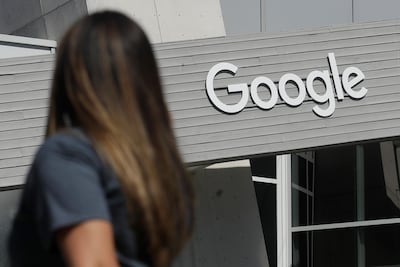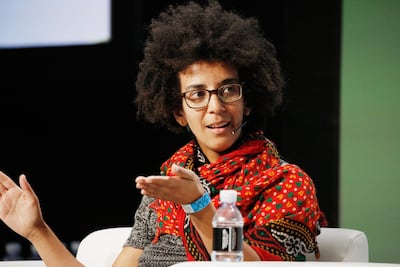Google’s decision to part ways with a prominent researcher laid bare divisions within the company’s artificial intelligence unit and subjected its leader, the lauded software engineer Jeff Dean, to widespread scorn.
Timnit Gebru, a renowned scientist and one of the few black women in AI, said last Wednesday she was fired over an email she wrote expressing dismay with management and the way it handled a review of her research.
Ms Gebru had been co-head of the team examining the ethical ramifications of AI.
What followed was a torrent of criticism aimed at Google’s AI division.
“The termination is an act of retaliation against Dr Gebru and it heralds danger for people working for ethical and just AI – especially black people and people of colour – across Google,” a group of hundreds of academics and researchers, many of them Google employees, wrote in an open letter.
Among their demands were that Mr Dean and his colleagues explain their decisions concerning Ms Gebru’s research.
The fallout threatens to tarnish the reputation of one of the industry’s leading research shops, a division of Alphabet's Google that aids development of lucrative products and contributes significantly to the world’s understanding of AI.
In a company brimming with computer scientists, few have been as revered as Mr Dean.
He oversees a sprawling research empire and has publicly championed more diverse hiring in AI and computer science.
His programming prowess became the subject of corporate lore and glowing press coverage, including one article that called him the “Chuck Norris of the internet”.
“Ousting Timnit for having the audacity to demand research integrity severely undermines Google’s credibility for supporting rigorous research on AI ethics,” said Joy Buolamwini, the founder of the Algorithmic Justice League, who wrote a ground-breaking paper with Ms Gebru on racism in facial recognition software.
The widely quoted 2018 study showed facial recognition software misidentified dark-skinned women as much as 35 per cent of the time – compared with near precision in white men.
Mr Dean and Google representatives did not respond to requests for comment. In an email to colleagues on Thursday, Mr Dean defended his handling of the matter.
He wrote in part that Ms Gebru had not followed company policy in submitting the paper for peer review, that it ignored “too much relevant research”, and that she and colleagues made unrealistic demands when informed “that it didn’t meet our bar for publication”.
Under Mr Dean, Google has assembled a diverse group of AI ethics scientists with backgrounds in tech and social science, but some of those employees are now wondering if they are free to do their jobs.
Inside Google’s research unit, several people openly questioned their future at the company, while others felt compelled to apologise to recently hired researchers, a source said.

The controversy came to a head last Wednesday, when Ms Gebru, the co-lead of Google’s Ethical Artificial Intelligence unit, posted on Twitter about her dismissal.
She said the company had demanded she retract a research paper she co-wrote that criticised computer language models, including methods Google uses for its search engine and voice assistant.
In an email to colleagues earlier in the week, Ms Gebru accused Mr Dean’s division of not hiring enough women and silencing employees from marginalised groups.
She told her colleagues to stop working “because it doesn’t make a difference”. In a subsequent message to Ms Gebru, Google quoted that email as “inconsistent with the expectations of a Google manager”.
In his email to staff, Mr Dean said he accepted Ms Gebru’s resignation after declining to meet her demands about the unpublished research paper.
He also mentioned her comments in support of a stopwork. “Please don’t,” the executive pleaded.
Mr Dean’s email did not go over well. On Twitter, Alex Hanna, a researcher on Google’ s Ethical AI team, accused Mr Dean of “spreading misinformation and misconstruals” in the email.
“I’m extremely disappointed in JeffDean today,” Kelly Ellis, a former Google engineer who now works at MailChimp, wrote on Twitter.
“Shame on you, Jeff Dean. I naively expected more from you,” said Eddie Kay, another former Google engineer.
Mr Dean joined Google in 1999 and climbed its ranks – he is now one of select senior vice presidents – largely on his software engineering ability.
In 2018, he was named the head of Google’s AI unit, widely considered the global leader in cutting-edge efforts such as speech detection and image recognition.
Soon, though, that job entailed dealing with controversies.
That year, Google staff rebelled against the company’s work on an AI project for the Pentagon.
Researchers at the company also spoke out about how bias in AI unfairly targeted people of colour in several instances, from Google’s Photo app to the algorithms used in bank loans and police work.
Since then, Google released a set of ethical guidelines for its AI, including barring facial recognition for surveillance.
The tech giant set up advisory councils, which struggled to function. It hired a handful of experts like Ms Gebru, who had worked at Microsoft, and paid them to research topics around AI and ethics.
Ms Gebru was one of five Google staff listed on the research paper at the heart of her dismissal, along with two outside researchers.
Emily Bender, a linguist from the University of Washington who co-wrote the research, said she did not know about the issues Google had with it.
“[Ms Gebru] is an incredibly respected leader in this field,” Ms Bender said. “By pushing her out, Google is losing a major asset.”
In the past two years, several internal critics of Google’s approach to AI and ethics have left the company.]
Last Thursday, staff on Mr Dean’s unit referred to these departures as a sign of the low morale on the team.
“The chilling effects of the decisions behind-the-scenes continue to haunt me,” Margaret Mitchell, co-head of the ethical AI team, wrote in an email.
Mr Dean took a more calibrated tone about the most recent exit.
“I know we all genuinely share Timnit’s passion to make AI more equitable and inclusive,” he wrote in the email to his staff.
“No doubt, wherever she goes after Google, she’ll do great work and I look forward to reading her papers and seeing what she accomplishes.”


